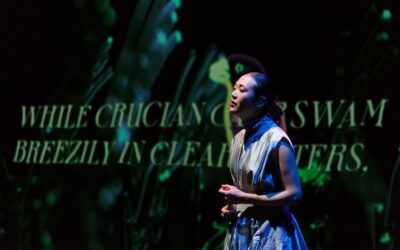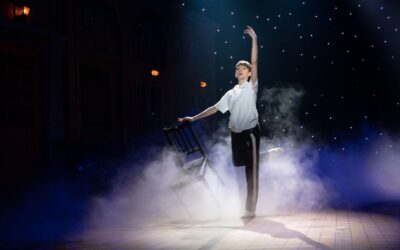By Darby Turnbull
Wish we could talk about how the means will
Not prepare you for the ends…
How your epiphanies become fair weather
Friends…
How death will make you lower your defences…
The only truth of youth is the grown up
Consequences – Stew.
One of the reasons musical theatre has been the artform I’ve connected with for as long as I can remember is that I’ve always felt its limitless potential. The way music, lyrics, dance and prose can offer insight into a person or a communities headspace has always felt like such a natural means of expression and therefore I don’t see there being a particular ‘style’ of musical that defines the form because the form must be built into the identity of the piece itself. Which is why I often find it disheartening when musicals are promoted in opposition to other musicals billed as being for ‘people who don’t like musicals’. For people who imagine chorus lines, quaint, easily digestible messages and a merry old time. Those shows absolutely exist; but art requires some cognitive adjustment to engage in its chosen communication and if we listen closely what might we experience? As we, the audience, enter Passing Strange at the Meat Market stables we are greeted with a cheeky playlist of Rogers and Hammerstein (and Hart) tunes, a deliberate dissonance to the kind of show we’re about to see.
The singer/songwriter Stew and his musical collaborator Heidi Rodewald and developed with director Annie Dorsen this 2008 musical is one of the under appreciated gems in modern musical theatre; despite receiving rave reviews during its run at the Public theatre, Broadway season, winning a Tony Award for best book of a musical and three Drama Desk awards for Outstanding music, lyrics and Musical and being filmed live by Spike Lee (of all people); is a deep dive for appreciators of musical theatre. I’ve personally been a fan of it for nearly a decade; picture a young, white trans kid sobbing whilst playing the cast recording on repeat. So, imagine my delight that Antipodes programmed this underseen show (I never thought I’d see it in Australia) with their signature passion and intelligence.
Directors’ Dean Drieberg and Cessalee Stovall production is one of the most emotionally resonant, vital and joyful theatrical and musical experiences I’ve had in years. Passing Strange tells the story of a young, middle class African American boy and his development as a person and musician through his search for authenticity, the’ Real’ through Church, recreational drugs, sex, friendship, romantic love, revolutionary politics, travel and death. It’s another in the canon of portrait of an artist as a young man and the art of making art and hits the emotional mark again and again. Stew and Rodewald’s eclectic score takes us through a range of different styles, blues, jazz, gospel, reggae, a little soft shoe in one case, to brilliantly convey the growing emotional headspace of our young protagonist. The book and lyrics contain the kind of statements that you just want to needlepoint onto pillows and wall tapestries, but you’d run out of room. There is a universality to the experience being explored; the quest of self identification and finding the truest versions of ourselves, but it doesn’t lose the specificity of its young, black, male protagonist. His identity as a young black man under the spectre of slavery in America is integral to the text and his own perceptions of black identity and those around him are explored with irony; at the start of the show when we are offered two versions of his mother; one in which she speaks in very, heighted, what we as the audience understand as stereotypical based on portrayals in media and then a more subdued, straight forward way. Likewise, when the protagonist’s validity as an artist is questioned, he appropriates the identity of a youth living in the ghetto, surrounded by crime and violence for white consumption when his upbringing was very middle class but still entrenched in racism but not the kind of racism that is as easily commodified by a white audience.
It’s important to note that I am a white person writing about this through a white lens and wish to acknowledge the complexity of the vacuum with which I experience and am writing about this piece.
The piece is structured like a gig and Drieberg and Stovell as production leaders have certainly evoked the raw elation that comes from being at what feels like being at the most exciting concert in town. Musical Director Marissa Saroca who plays the keys and their band, Chelsea Allen on Drums, Will Gijsbers on Guitar and Christopher Michigan on Bass absolutely blow the roof off the venue with their humour, vitality and subtlety of musical expression. Bianca Pardo has designed a functional, multi-faceted performance space that serves the piece as a concert whilst also being adept at letting the narrative flow. Loredo Malcolm’s accessible, fluid choreography fits into her design wonderfully and compliment Pardo’s clever, streetwear inspired costumes that the cast can easily move in also filled with personality.
Sam Wylie’s lighting design is a revelation, detailed, evocative in the evolution of mood and makes the cast look absolutely stunning. Evan Drill’s complex sound design had its moments where it didn’t co-operate through no fault of his own, it’s a joy in a show like this that you can, for the most part actually hear the lyrics over the vivacity of the band.
This was a harder opening night than some; in Act 2 during two emotionally complex moments the show was interrupted by technical difficulties and an audience member falling ill (the individual in question was recovering after the show) and it’s an absolute testament to every member of the team, led by stage manager Annie Gleisner, to the professionalism and empathy with which they moved forward. Marissa Saroca led the band in some impromptu jamming and kept up a charming banter and the cast kept resumed the emotional pace with skill and humour.
What a cast it is! Grant Young as the Youth possesses that rare chameleon quality of being able to convey the rapid evolution of a young person’s personality and worldview based on the newness of every experience. His wonderfully expressive face takes us through every emotional beat with fascinating clarity; his character is callow, pretentious, dismissive, naïve and often cruel and Young’s triumph is being able to honestly convey the necessary growth that comes from essential life lessons.
Given the tunnel vision of his point of view it’s even more potent with how emotionally present and nuanced the performances of each member of the cast is at showing the depth of feeling which he can’t see and only gets occasional glimpses of. Pick any member of the cast and they’ll tell you a different story with their body language and facial expressions even just by sitting watching in half light.

Sasha Hennequin as Youth’s mother is a magnetic presence in her poised and fierce portrayal of a parent coming to terms with her child not so much growing up as a growing away from her. She completely obliterates the trope of the ‘understanding, undermined’ mother figure by furiously asserting her worth and dignity in the face of her child’s dismissiveness. Hennequin gives a stunning, emotional and often very funny performance of a full human being whose deferred her own desires for so long and is confronted with the emptiness that comes when her efforts are no longer needed.
Zahrah Andrews, Tier Ataing, Gabriela van Wyk and Theo Williams are an indelible ensemble taking on a range of characters with aplomb with each having their moment to make their individual marks. Theo Williams is a comic force to be reckoned with, like all brilliant character actors his clowning is tinged with tragedy; such as his church kid’s existential crisis whilst on an acid high and hysterical German performance artist; he also has an electric vocal solo which makes me yearn to see him in more prominent singing roles in future to get the full effect.
Gabriela van Wyk is joyful and effervescent, providing detailed characterisations in a few instances when she represents various objects of desire for the protagonist; in the case of Marianna, the Dutch artist the Youth shacks up with she is excellent at conveying cool detachment, slight absurdity of a self-absorbed artist before a powerful switch when she makes Youth see her as full person with a single word ‘no’.
Zahrah Andrews possesses a magnificently rich and soulful stage presence both vocally and emotionally; really coming into her own later in the show as the mature, radical artist whose the protagonists second love interest and is much further along in her personal odyssey than he is. She’s incredibly relatable in her conflicted feelings about how much she’s willing to put up with from this self-absorbed and callow young man.
Tier Ataing comes close to stealing the show in his early highlight as Mr. Franklin the church pianist who possess the soulful legacy of James Baldwin and Josephine Baker but stuck in the suburbs with no means of escape. Ataing is singularly potent at embodying a weary but self possessed queen who comes alive when imparting knowledge and fabulous stories about Europe, Avant Garde art and important moments in black literary and musical history and the sadness of having full self-fulfilment that those places and artists represent beyond their grasp.
Then there’s Augustin Tchantcho. In the original production Stew himself narrated and led the show and it’s indelibly linked to him. Tchantcho gives what may just be my personal favourite performance by a male artist of the year and probably years to come and in all justice will get the richly deserved attention of awards committees and audiences. In addition to being quite possibly the most charismatic performer I’ve seen on our professional stage in quite some time he possesses the gravitas and generosity of an artistic veteran imparting the gifts of hard earned wisdom and empathy. The way he watches his younger self contains multitudes; pride, awe, shame, embarrassment, acceptance; he’s a witty, cool, suave entertainer with his knowing asides and finally a deconstruction of the pain and euphoria of those who entertain and create. There’s’ a unique kind of performer who can take an audience through a complex emotional exploration in real time and Tchantco does it twice. During his emotionally climactic song the show had to be stopped to attend to unwell audience member and after the individual had been taken to safety and attended to, he brought the same level of emotional commitment and full bodied passion a second time. It was at an awful cost, but what an opportunity to see such a profound display of artistry twice back to back.
The stars are shining brightly both onstage, behind it and in the tech booth.

Art can’t be experienced in a vacuum; even though this is not a show where reproductive rights are addressed, the Melbourne audience walked in with the knowledge that in America Roe vs. Wade has been overturned in a chilling demonstration of state control over the health and autonomy of people with reproductive organs. Passing Strange is from my eyes a show about self actualisation; having the freedom to learn, to grow into yourself, to quote another musical theatre composer the late Stephen Sondheim ’The choice may have been mistaken, the choosing was not’. It forces us to reflect on who has freedom of movement and choice and exactly what that means. As the theatre industry reckons with our own complicity in white supremacy and the opportunities and representations afforded to people of colour, here we have a show that’s a nuanced, complex and a specific representation of one person’s emotional growth and worldview. When white individuals (including myself) and the institutions we occupy say ‘Black lives matter’ and use ‘diversity’ as a slogan how much reflection is there into what that actually means? Through what lens are we viewing the experiences of people outside of our experience? What experiences are being elevated and which are being decided aren’t commercially viable? Passing Strange is an opportunity to sit with that complexity, to sit with catharsis, doubt and then move forward.
If you can get a ticket for the limited two week run, Passing Strange is an opportunity to commune and connect with your fellow audience members and incredible team of artists. And if it’s safe for you to do so, call your mother afterwards.
Images:Angel Leggas





